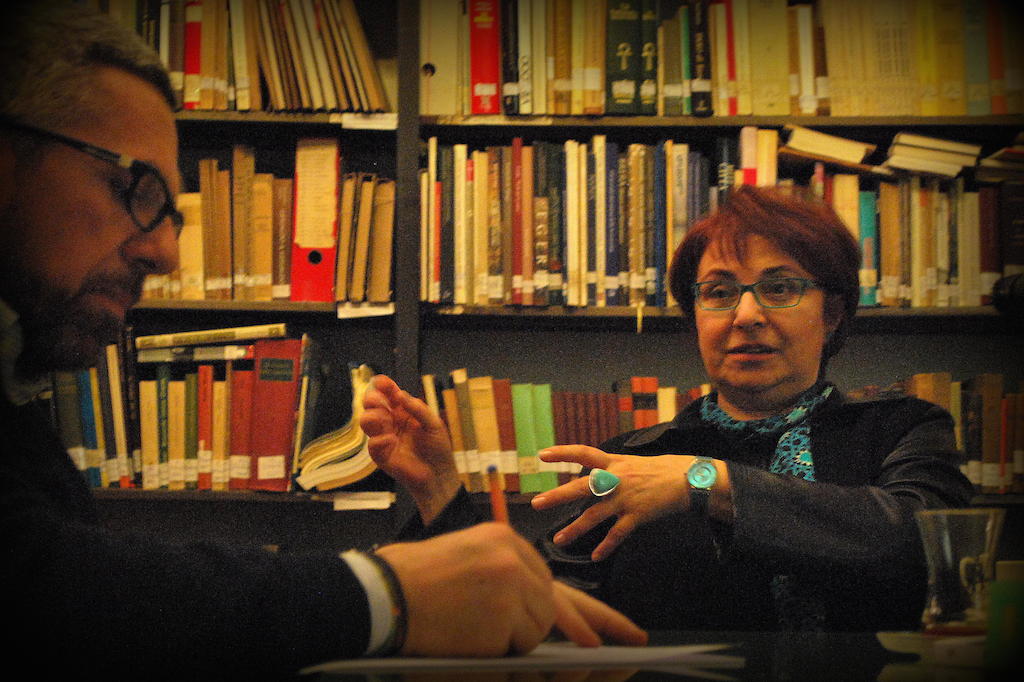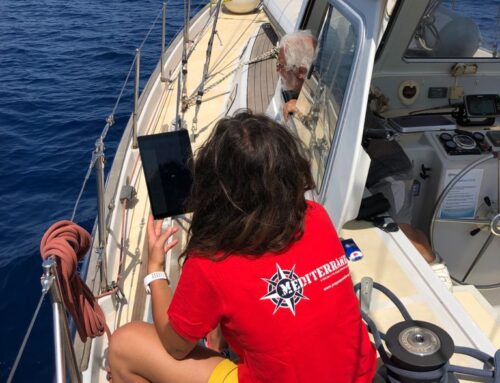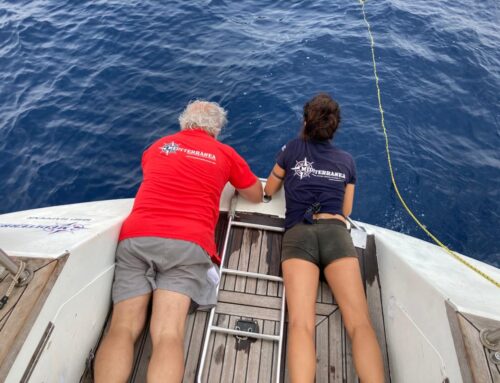
(by Simone Perotti)
“You’re asking me if we Turkish are Mediterranean? Good question. Our identity is difficult to define”. Buket Uzuner is a beautiful woman, with refined manners, and you can tell immediately that she is an educated, active and well-travelled woman who knows the world. She speaks in almost perfect English, choosing her words carefully, but without hesitation. Her thoughts are her own, companions of a long journey of reflection and feelings.
For me it is a pleasure to meet her, since I have adored her “Mediterranean Waltz”, one of the best novels I have read in the last ten years.
“At school we are taught that there are three seas around Turkey: The Black Sea, the Marmara and the White Sea (editor’s note: this is what the Turks have called the Mediterranean since the time of Dragut Rais), and many here say that we are Oriental, or a Middle Eastern people. I believe that models change in time, so it is difficult to define, firstly because we often do not know our identity, and secondly because it changes in time.”
Buket Uzuner is not avoiding the question, she is going around it, considering it. She tells me that she has always defined herself as a Mediterranean writer, and the “Mediterranean model” is a daily theme, she has thought about it, she has suggested the stylistic features, she tells me that when they discussed this, in Turkey, they believed it was Antalya, in other words that it referred to the South coast of the country. In any case, what is the Mediterranean model? Is it Maghreb? Persian? Western? “The Ottomans brought coffee to Vienna. It had come to them from the Yemen, where it had come from Eritrea. Is coffee then Mediterranean? ” Interesting and shrewd questions. “Here the idea that we are Asian, from the Middle Eastern, is very strong, and perhaps, in some way, helps the spread of Islam. And no one can nor should deny their background. But then we must speak of the Hittites, the Sumerians, and Shamanism, that I have been studying for years. We are Shaman, well before being Islamic. Archaeology confirms this. Certainly those who deny our Mediterranean roots do not help the process of finding our identity“.
We talk about the Mediterranean. We discuss its great aggregation systems, its strong cohesive and even destructive cells. We agree that today a Mediterranean model for social bonding, society, the life of individuals, growth and well-being, does not exist. One needs to find it. “You see, for me the true model is called dignity, freedom, equality.” The writer is coming out here, the pleasure of thoughts, words and phrases. “When we feel uncomfortable about the American, North European model, it is these values that we are referring to. And actually, we find many of these in the Mediterranean. Climate, food, sunshine and music have made us sensitive to particular values, which are part of us. When I am abroad, wherever I am, I am initially transported by the lifestyle and symbols of others. It happened especially in my earliest trips to the West. But then I found myself missing the taste of olive oil, and it is by no means trivial to say so. I’m not a child who doesn’t want to grow up, my symbolic naivetéis a choice, and this too is a Mediterranean attitude. “I ask her from where one could start to define a possible new model, that will help us, that we need, that we can follow and aspire to. She answers impulsively: “Food and music!”. And then she thinks about it: “You’re right though when you say that the great powers want us to be divided in our great cultural and social area. If we are divided we are more useful. Abroad many friends ask me if I feel more European or Asian. I am rather tired of hearing this question, which is a superficial one. I feel that I am both, and this, incidentally, defines me as Mediterranean.” Then Buket draws patterns in the air with her fingers. She traces a sheet and points her index finger at the corners: “This is where I would place the health, which is the most important thing; then the power that health gives you, the energy; then the youth, which is the hope of future generations; and in the fourth corner I would put the joy of living, the game. These are the four cornerstones of a possible line of reasoning on the Mediterranean model. And then if you look at this sheet from the outside, what you see at the centre is the word Freedom“. What a beautiful model, her depiction of a sheet to draw an hypothesis of life is truly beautiful.
Quite naturally, we end up talking about politics. Buket tells me that she finds it hard to agree with some recent decisions of Turkish politics. “Our country is divided in two, two different and fairly opposing halves in terms of ideals and values. And this is not a good sign. If the divisions are not healed, there is always the risk of an authoritarian turning point.” Words that make you think.
I ask her about the prevailing values: “There is a great deal of populism. In part it is understandable, but beyond a certain limit it is excessive. My mother was very religious, she prayed, kept to the rules, but she would never have dreamt of wearing a veil. In those years, and even earlier, there was no oppression against religious persons. Now it seems to me that there is a certain oppression of democracy, which in those years one could not denigrate or abuse with words or actions. But today …”.
She explains that the real problem is not so much Erdogan or a party that was voted by many citizens. The problem is the minority, the fact that there is no opposition, and when there is, is divided. “We all really need to refer to an attracting Mediterranean model, that would perhaps help us to build an alternative.”
I ask her about Gezi Park. What is left? Some say that this is not a real movement. “It takes time. Things happen. It was nice to see one’s neighbour in the streets. It made us feel better, more united. Now we need time, lots of initiatives, to carry on the process. I was elected in my municipality, I work, I persevere. I would never had done so without Gezi. Gezi has encouraged many to take action, and this is a first example of his influence and contribution.”
We are smiling when we finish: “I have hope. I believe in the power of good. Look at what happened with Tsipras. He seems to be applying a Mediterranean model. And I find his attempt very, very interesting.”
I ask her who she thinks the leader of the opposition who can offer an alternative in the future could be. She thinks about it. Then answer me like this:”A boy said something he should not have said, some time ago. Two policemen arrested him and took him to the police station. Well, I believe that he is the boy who will be the leader of the opposition in the near future.”





Leave A Comment